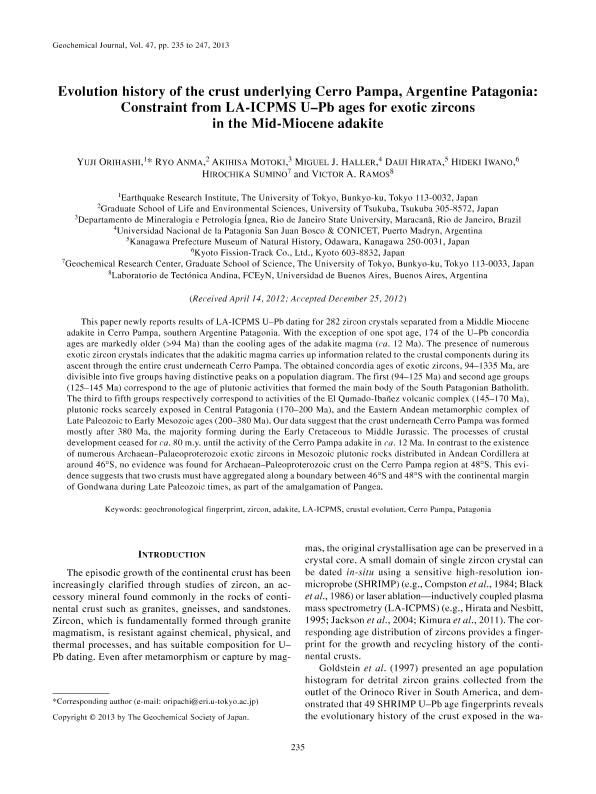Mostrar el registro sencillo del ítem
dc.contributor.author
Orihashi, Yuji
dc.contributor.author
Anma, Ryo
dc.contributor.author
Motoki, Akihisa
dc.contributor.author
Haller, Miguel Jorge F.

dc.contributor.author
Hirata, Daiji
dc.contributor.author
Iwano, Hideki
dc.contributor.author
Sumino, Hirochika
dc.contributor.author
Ramos, Victor Alberto

dc.date.available
2016-04-27T14:19:17Z
dc.date.issued
2013-04
dc.identifier.citation
Orihashi, Yuji; Anma, Ryo; Motoki, Akihisa; Haller, Miguel Jorge F.; Hirata, Daiji; et al.; Evolution history of the crust underlying Cerro Pampa, Argentine Patagonia: Constraint from LA-ICPMS U-Pb ages for exotic zircons in the Mid-Miocene adakite; Geological Society of Japan; Geochemical Journal; 47; 2; 4-2013; 235-247
dc.identifier.issn
0016-7002
dc.identifier.uri
http://hdl.handle.net/11336/5400
dc.description.abstract
This paper newly reports results of LA-ICPMS U-Pb dating for 282 zircon crystals separated from a Middle Miocene adakite in Cerro Pampa, southern Argentine Patagonia. With the exception of one spot age, 174 of the U-Pb concordia ages are markedly older (>94 Ma) than the cooling ages of the adakite magma (ca. 12 Ma). The presence of numerous exotic zircon crystals indicates that the adakitic magma carries up information related to the crustal components during its ascent through the entire crust underneath Cerro Pampa. The obtained concordia ages of exotic zircons, 94-1335 Ma, are divisible into five groups having distinctive peaks on a population diagram. The first (94-125 Ma) and second age groups (125-145 Ma) correspond to the age of plutonic activities that formed the main body of the South Patagonian Batholith. The third to fifth groups respectively correspond to activities of the El Qumado-Ibañez volcanic complex (145-170 Ma), plutonic rocks scarcely exposed in Central Patagonia (170-200 Ma), and the Eastern Andean metamorphic complex of Late Paleozoic to Early Mesozoic ages (200-380 Ma). Our data suggest that the crust underneath Cerro Pampa was formed mostly after 380 Ma, the majority forming during the Early Cretaceous to Middle Jurassic. The processes of crustal development ceased for ca. 80 m.y. until the activity of the Cerro Pampa adakite in ca. 12 Ma. In contrast to the existence of numerous Archaean-Palaeoproterozoic exotic zircons in Mesozoic plutonic rocks distributed in Andean Cordillera at around 46°S, no evidence was found for Archaean-Paleoproterozoic crust on the Cerro Pampa region at 48°S. This evidence suggests that two crusts must have aggregated along a boundary between 46°S and 48°S with the continental margin of Gondwana during Late Paleozoic times, as part of the amalgamation of Pangea.
dc.format
application/pdf
dc.language.iso
eng
dc.publisher
Geological Society of Japan
dc.rights
info:eu-repo/semantics/openAccess
dc.rights.uri
https://creativecommons.org/licenses/by-nc-sa/2.5/ar/
dc.subject
Geochronological Fingerprint
dc.subject
Zircon
dc.subject
Adakite
dc.subject
La-Icpms
dc.subject.classification
Geoquímica y Geofísica

dc.subject.classification
Ciencias de la Tierra y relacionadas con el Medio Ambiente

dc.subject.classification
CIENCIAS NATURALES Y EXACTAS

dc.title
Evolution history of the crust underlying Cerro Pampa, Argentine Patagonia: Constraint from LA-ICPMS U-Pb ages for exotic zircons in the Mid-Miocene adakite
dc.type
info:eu-repo/semantics/article
dc.type
info:ar-repo/semantics/artículo
dc.type
info:eu-repo/semantics/publishedVersion
dc.date.updated
2016-05-06 15:52:43.262787-03
dc.journal.volume
47
dc.journal.number
2
dc.journal.pagination
235-247
dc.journal.pais
Japón

dc.journal.ciudad
Tokio
dc.description.fil
Fil: Orihashi, Yuji. The University of Tokyo. Earthquake Research Institute; Japón
dc.description.fil
Fil: Anma, Ryo. University of Tsukuba. Graduate School of Life and Environmental Sciences; Japón
dc.description.fil
Fil: Motoki, Akihisa. Rio de Janeiro State University. Departamento de Mineralogia e Petrologia Ígnea; Brasil
dc.description.fil
Fil: Haller, Miguel Jorge F.. Universidad Nacional de la Patagonia "San Juan Bosco"; Argentina. Consejo Nacional de Investigaciones Científicas y Técnicas. Centro Nacional Patagónico; Argentina
dc.description.fil
Fil: Hirata, Daiji. Kanagawa Prefecture Museum of Natural History; Japón
dc.description.fil
Fil: Iwano, Hideki. Kyoto Fission-Track; Japón
dc.description.fil
Fil: Sumino, Hirochika. University of Tokyo. Graduate School of Science. Geochemical Research Center; Japón
dc.description.fil
Fil: Ramos, Victor Alberto. Universidad de Buenos Aires. Facultad de Ciencias Exactas y Naturales. Departamento de Geología. Laboratorio de Tectónica Andina; Argentina. Consejo Nacional de Investigaciones Científicas y Técnicas. Oficina de Coordinación Administrativa Ciudad Universitaria. Instituto de Estudios Andinos; Argentina
dc.journal.title
Geochemical Journal

dc.relation.alternativeid
info:eu-repo/semantics/altIdentifier/url/https://www.jstage.jst.go.jp/article/geochemj/47/2/47_2.0242/_article
dc.relation.alternativeid
info:eu-repo/semantics/altIdentifier/doi/10.2343/geochemj.2.0242
dc.relation.alternativeid
info:eu-repo/semantics/altIdentifier/url/http://doi.org/10.2343/geochemj.2.0242
Archivos asociados
